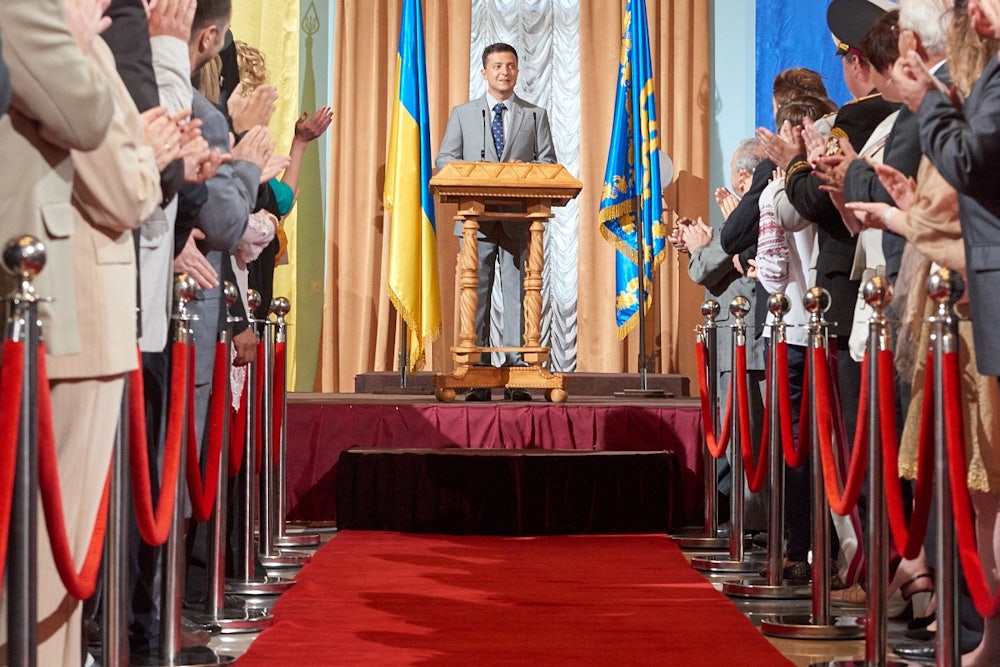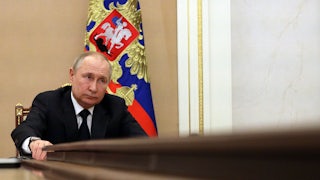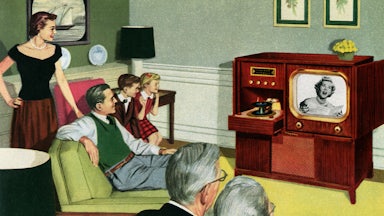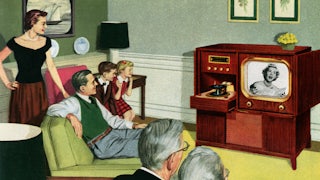In 2016, a critical mass of Americans chose to send a TV star to the White House, not in spite of but precisely because of his lack of previous experience in policymaking. Many of them thought they were voting for the character they had seen him play on The Apprentice for 14 seasons: a gruff, no-nonsense corporate executive who sits behind a huge desk intimidating underlings and firing them at will when they displease him. This, his supporters hoped, was what Donald Trump would do to the various subalterns whom he and they blamed for America’s decline. That the real Donald Trump was a grifter, a failed businessman, and a spoiled heir who squandered a real estate empire was beside the point. He could play a decisive leader on television, and what greater qualification does one need to actually be president?
The blurring of entertainment and politics is by now so advanced that we are likely to see more TV stars elected to office, and not only in the United States. Today, the eyes of the world are on Volodymyr Zelenskiy, Ukraine’s indefatigable wartime president (and a very different man from Trump), whose previous job was playing a fictional Ukrainian president on a hit TV comedy called Servant of the People, which aired from 2015 to 2019. In one of the more audacious examples of life imitating art, Zelenskiy pivoted directly from the show’s third season to actually running for president as the head of a new political party also called Servant of the People. He won with 73 percent of the vote against the incumbent president, Petro Poroshenko, and three years later the former comedian finds himself defending his country from the largest military invasion in Europe since World War II.
Ukraine is rarely captured in Western media outside of the context of human tragedy, whether in the form of today’s bombed-out cities, mass graves, and desperate refugees or the twentieth century’s pogroms, collectivization, famine, and genocidal war. But for those wishing to see Ukraine in a gentler—if not exactly flattering—light, the first season of Servant of the People is now streaming on Netflix, and it’s a hoot. The 23 half-hour episodes currently available present post-Soviet Ukraine as a deeply troubled nation in perpetual crisis but also as one populated by ordinary, flawed, likable people trying to lead decent lives. In the process, Servant reveals something of the aspirations that Ukrainian voters invested in Zelenskiy when they decided to give him a shot at governing them. Most of all, in these bleak days, it’s very funny. To be sure, the comedy is unsubtle, juvenile, and slapstick—it’s the kind of show where a character faints when they hear surprising news—but after a decade of prestige dramedies that offer more awkwardness than laughs, that can be refreshing too.
Zelenskiy plays a high school history teacher in his late thirties named Vasily Petrovich Goloborodko—and before I go any further, I want to make a quick note about spelling. When Vladimir Putin launched his “special military operation” in Ukraine, he justified it as a defense of supposedly persecuted Russian-speakers in a country that he claimed is controlled by Ukrainian-speaking Nazis who seized power in a NATO-backed coup in 2014. Given that, one of the most remarkable things about Servant, which launched a year after that so-called coup (referred to by Ukrainians as the Maidan uprising or the Revolution of Dignity), is that it’s almost entirely in Russian—Zelenskiy’s first language and the primary language of millions of Ukrainians who nonetheless identify with their country and reject “liberation” by Putin. Netflix’s English subtitles use transliterated Ukrainian spellings, referring to Zelenskiy’s character as Vasyl Petrovych Holoborodko, but I’m going with the Russian spelling here, because that’s what the characters say out loud and because it seems perverse to grant Putin’s Russia a monopoly on the Russian language. That a Russian-language comedy was a recent hit in Ukraine—to the point of propelling its star to the presidency—is itself a testament to a multicultural model of nationalism that feels like an antidote to Putin’s imperialist rhetoric.
When we first meet Goloborodko, he is a mild-mannered divorcé who lives with his parents and his teenage niece in a Khrushchev-era one-bathroom flat in Kyiv. He’s on decent terms with his ex-wife, Olga (Olena Kravets), who is the primary caretaker of their one child, and he’s liked but not exactly respected by his family, students, and colleagues. He’s an everyman, in other words, until suddenly and seemingly out of nowhere he learns that he’s been elected president of Ukraine. In a series of flashbacks, we see that some months back one of his students secretly filmed Goloborodko’s expletive-laden rant against Ukraine’s pervasive corruption and uploaded it to YouTube, where it went viral and turned the hapless teacher into a national celebrity. Absent any encouragement from Goloborodko himself, his students crowdfunded an effort to put his name on the presidential ballot, and then, without any campaigning whatsoever.…
Americans have seen this movie before, sort of, in Kevin Kline’s Dave (1993) and Chris Rock’s Head of State (2003). But the regular-guy-becomes-president fable takes on a different dimension in Ukraine, because the corruption that Goloborodko decries on YouTube isn’t simply a matter of a handful of secretive oligarchs manipulating the country’s nominal political leadership—although that’s very much part of it. In Servant, corruption is a deep-seated part of Ukrainian national culture, afflicting every level of society and the most intimate everyday interactions.
Even before Goloborodko assumes the responsibilities of governing, we see this culture in the instantaneous transformation of the way everyone around him behaves following his victory. The local bank branch forgives all his debts, claiming he won a lottery; a department store sells his relatives fancy clothes for the inauguration at steep discounts, claiming a special sale; his niece’s deadbeat ex-boyfriend resurfaces in a pathetic bid to reconcile. Goloborodko’s once disappointed father (Viktor Saraykin) is suddenly beaming with pride and determined to renovate the family’s dumpy apartment in palatial style (and to evict neighboring tenants, until his wife objects). Goloborodko, we learn, is sincere, honest, and squeaky clean, but everyone around him is eager to cash in on their sudden proximity to power.
It’s easy to see how a show like this could be grating and condescending. In its sympathetic portrait of a good-government reformer struggling against both a corrupt political system and a venal and ungrateful public, it has some parallels to Parks and Recreation, which ended its seven-season run in 2015, the same year Servant premiered. But while Parks and Recreation (and the strain of liberal politics it channeled) never found a huge audience, Servant clearly resonated with ordinary Ukrainians. Zelenskiy has been compared to Jon Stewart, and indeed there’s something of The Daily Show’s George W. Bush–era heyday to his comedy—a broadly accessible goofiness mixed with earnest lectures about the failings of the political class. Stewart’s anti-political, commonsense style—exemplified by the vacuous “Rally to Restore Sanity” he and Stephen Colbert headlined on the National Mall in 2010—has drawn sharp criticism from leftists who see it as toothless in the face of an organized and illiberal right. But there was a time when it seemed like a righteous appeal to a jaded electorate—arguably, this was Barack Obama’s pitch during his history-making first presidential run in 2008, at the height of Stewart’s popularity. There’s a lot of that spirit in Servant, and it’s understandable why Ukrainians, fed up with their broken and regionally polarized political system, decided to give Zelenskiy a chance to govern the way Goloborodko does on the show.
It should be acknowledged that Goloborodko’s governance, at least over the course of the first season, is a bit of a mess. At first, the role of president appears ceremonial; Goloborodko’s job is to look presentable on television and to read scripted remarks prepared for him by the wily Prime Minister Yuriy Ivanovich Chuiko (Stanislav Boklan), who seems to run the government on behalf of those aforementioned oligarchs. Goloborodko resists the trappings of the presidency, from the vulgar off-the-books mansion built by his predecessor to the private limos to (at least initially) any security detail; he imagines he can bike or take public transit to work with nothing to fear from his fellow citizens. Dismayed at the quality of civil servants in the capital—every member of Chuiko’s rubber-stamp parliament lives in obscene luxury funded by shameless looting of public services—he makes the questionable decision to fill his Cabinet entirely with childhood friends. Thus his ex-wife, a bank teller, becomes finance minister; a beat cop who refuses to take bribes (Oleksandr Pikalov) becomes defense minister; and the loutish actor Sergei Viktorovich Mukhin (Yevhen Koshovy) becomes foreign minister. Appointing unqualified cronies to top government posts is an odd way to fight corruption, and some critics have accused the real Zelenskiy of following suit, but it does make for good comedy (Koshovy in particular steals every scene he’s in), and it contains a kernel of serious political critique: Servant suggests that in a country where integrity is an impediment to political advancement, honest public servants can only be found working the most mundane jobs in total obscurity.
For a country that has been libeled by Kremlin propaganda as neo-Nazi—a charge some Americans on both left and right have accepted at face value—Ukraine as portrayed on Servant is curiously absent of any hint of far-right activity. That is not to say that the show whitewashes Ukrainian politics: It’s notable, given that Zelenskiy himself is Jewish, that his character is described in passing as ethnically Ukrainian, and there are scattered hints that at least one of the nefarious oligarchs is Jewish (as quite a few Ukrainian and Russian oligarchs actually are). But as a document of what Ukrainians were most concerned about in the years between the Maidan uprising and Putin’s full-scale invasion, Servant is singularly focused on the battle against corruption and pays minimal attention to divisions over language, ethnicity, or history.
Speaking of history, Goloborodko’s training in that discipline is the basis for a running gag in which he is visited by the apparitions of dead world leaders with lessons—not always helpful ones—on how to govern. Abraham Lincoln, Julius Caesar, Che Guevara, and Louis XVI all make appearances in Goloborodko’s subconscious, but the most memorable such episode comes at the end of the first season, when Goloborodko confronts the sixteenthth-century Russian Czar Ivan the Terrible. For the most part, Russia lingers in the background on Servant, which is concerned above all with Ukraine’s domestic politics. But it’s impossible to watch Zelenskiy stand up to the spirit of Russian autocracy and assert that Ukraine will follow its own unique path without thinking about how much blood Russia is spilling right now, seven years later, to block that path—and without feeling a little inspired. Right now Ukraine isn’t fighting for fascism or precisely for liberalism, but for its basic right to sovereignty. And what sovereignty really means, Servant of the People suggests, is that even a dysfunctional society is entitled to muddle through on its own terms.






